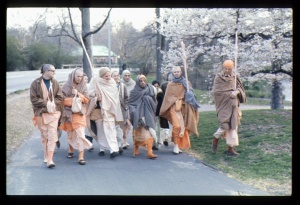CC Madhya 15.111

A.C. Bhaktivedanta Swami Prabhupada
TEXT 111
“ataeva yāṅra mukhe eka kṛṣṇa-nāma
sei ta’ vaiṣṇava, kariha tāṅhāra sammāna”
SYNONYMS
ataeva—therefore; yāṅra mukhe—in whose mouth; eka—one; kṛṣṇa-nāma—the holy name of Kṛṣṇa; sei ta’ vaiṣṇava—he is a Vaiṣṇava; kariha—offer; tāṅhāra—to him; sammāna—respect.
TRANSLATION
Śrī Caitanya Mahāprabhu then finally advised, “One who is chanting the Hare Kṛṣṇa mantra is understood to be a Vaiṣṇava; therefore you should offer all respects to him.”
PURPORT
In his Upadeśāmṛta (5), Śrīla Rūpa Gosvāmī states: kṛṣṇeti yasya giri taṁ manasādriyeta dīkṣāsti cet praṇatibhiś ca bhajantam īśam. An advanced devotee should respect a person who has been initiated by a bona fide spiritual master and who is situated on the transcendental platform, chanting the holy name with faith and obeisances and following the instructions of the spiritual master. Śrīla Bhaktivinoda Ṭhākura comments that serving Vaiṣṇavas is most important for householders. Whether a Vaiṣṇava is properly initiated or not is not a subject for consideration. One may be initiated and yet contaminated by the Māyāvāda philosophy, but a person who chants the holy name of the Lord offenselessly will not be so contaminated. A properly initiated Vaiṣṇava may be imperfect, but one who chants the holy name of the Lord offenselessly is all-perfect. Although he may apparently be a neophyte, he still has to be considered a pure, unalloyed Vaiṣṇava. It is the duty of the householder to offer respects to such an unalloyed Vaiṣṇava. This is Śrī Caitanya Mahāprabhu’s instruction.